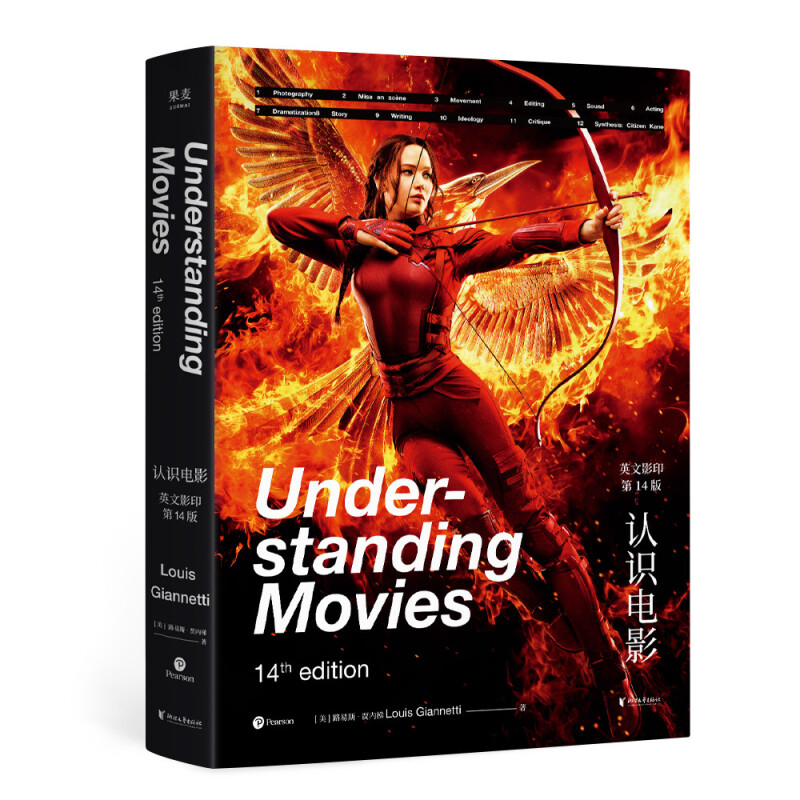
认识电影:影印第14版

温馨提示:5折以下图书主要为出版社尾货,大部分为全新(有塑封/无塑封),个别图书品相8-9成新、切口有划线标记、光盘等附件不全详细品相说明>>
- ISBN:9787533964979
- 装帧:简裝本
- 册数:暂无
- 重量:暂无
- 开本:16开
- 页数:552
- 出版时间:2021-11-01
- 条形码:9787533964979 ; 978-7-5339-6497-9
本书特色
◆长销40年的经典电影入门书,北京电影学院、浙江大学研究生推荐阅读书目,出版以来备受电影人、学生和影迷喜爱
◆ 升级修订第14版,增补修订约100页内容,如新增对CGI、动作捕捉、类型电影、商业大片、电影明星等影视产业前沿话题的探讨,以及增补替换了近百部2000年后的新电影案例,如《星际穿越》《少年派的奇幻漂流》等
◆ 摄影、调度、剪辑、声音、表演、故事……用专业而简明易懂的方式介绍电影的方方面面,一本书窥探电影世界全貌;侧光、长焦、蒙太奇、荷兰式镜头、次文本……快速充能专业知识,评论电影不再只说“牛牛牛”
◆ 英文原文影印,还原原版排版设计,原汁原味品味大师笔触,珍藏之选
内容简介
本书为长销40年的经典电影入门书《认识电影》英文影印4版。自问世以来,《认识电影》已被翻译为十几种语言,并被北京电影学院、北京大学、哈佛大学、MIT、纽约大学等知名院校指定为影视课程教材,深受优选读者和电影行业专业人士认可,被认可为了解电影艺术的入门佳作。
《认识电影》从电影理论的典型视角出发,辅以大量电影片例,简明扼要地评论了电影艺术的方方面面。全书围绕电影制作核心要素组织结构,共分十二章,收录超500幅精美电影剧照和图片,章后附有延伸阅读,书末缀有重要词汇表和影片图例。作者以鞭辟入里的分析、新颖独到的见解和纷繁多样的视觉冲击,呈现给读者一个丰富多姿的电影世界。
全新修订的4版修订增补了近100页内容:一、增添了对CGI、动作捕捉等当下电影前沿制作技术的阐述分析;二、更多对经典电影和好莱坞黄金时代电影的探讨,如《春闺风月》《费城故事》;三、更多对当代电影明星(詹妮弗·劳伦斯、汤姆·克鲁斯等)的讨论;四、更多对类型电影和商业大片的讨论,如《银河护卫队》《侏罗纪世界》等;五、增补替换了近百部2000年后的新电影案例,如《星际穿越》《少年派的奇幻漂流》等。
目录
Preface
Acknowledgments
Chapter 1 PHOTOGRAPHY
Realism and Formalism
The Shots
The Angles
Light and Dark
Color
Lenses, Filters, and Stocks
The Digital Revolution
The Cinematographer
Further Reading
Chapter 2 MISE EN SCèNE
Composition and Design
Territorial Space
Proxemic Patterns
Open and Closed Forms
Further Reading
Chapter 3 MOVEMENT
The Moving Camera
Mechanical Distortions of Movement
Further Reading
Chapter 4 EDITING
Continuity
D. W. Griffith and Classical Cutting
Soviet Montage and the Formalist Tradition
André Bazin and the Tradition of Realism
Further Reading
Chapter 5 SOUND
Historical Background
Sound Effects
Music
Musicals
Spoken Language
Further Reading
Chapter 6 ACTING
Stage and Screen Acting
The American Star System
Styles of Acting
Casting
Further Reading
Chapter 7 DRAMATIZATION
Time, Space, and Language
The Director
Settings and Décor
Costumes and Makeup
Further Reading
Chapter 8 STORY
Narratology
The Spectator
The Classical Paradigm
Realistic Narratives
Formalistic Narratives
Nonfictional Narratives
Genre and Myth
Further Reading
Chapter 9 WRITING
The Screenwriter
The Screenplay
North by Northwest:he Screenplay
Figurative Comparisons
Point of View
Literary Adaptations
Further Reading
Chapter 10 IDEOLOGY
The Left-Center-Right Model
Culture, Religion, and Ethnicity
Feminism
Queer Cinema
Tone
Further Reading
Chapter 11 CRITIQUE
Theories of Realism
Formalist Film Theories
The Auteur Theory
Eclectic and Synthesizing Approaches
Structuralism and Semiology
Historiography
Further Reading
Chapter 12 SYNTHESIS: Citizen Kane
Photography
Mise en Scène
Movement
Editing
Sound
Acting
Dramatization
Story
Writing
Ideology
Critique
Further Reading
Glossary
Text Credits
Index
节选
Even before 1900, movies began to develop in two major directions: the realistic and the formalistic. In the mid?1890s in France, the Lumi?re brothers delighted audiences with their short movies dealing with everyday occurrences. Such films as The Arrival of a Train (see 4-4a) fascinated viewers precisely because they seemed to capture the flux and spontaneity of events as they were viewed in real life. At about the same time, Georges Méliès (pronounced mel-yez) was creating a number of fantasy films that emphasized purely imagined events. Such movies as A Trip to the Moon (see 4-4b) were typical mixtures of whimsical narrative and trick photography. In many respects, the Lumières can be regarded as the founders of the realist tradition of cinema, and Méliès of the formalist tradition.
Realism and formalism are general rather than absolute terms. When used to suggest a tendency toward either polarity, such labels can be helpful, but in the end they’re just labels. Few films are exclusively formalist in style, and fewer yet are completely realist. There is also an important difference between realism and reality, although this distinction is often forgotten. Realism is a particular style, whereas physical reality is the source of all the raw materials of film, both realistic and formalistic. Virtually all movie directors go to the photographable world for their subject matter, but what they do with this material—how they shape and manipulate it—is what determines their stylistic emphasis.
作者简介
作者 | 路易斯·贾内梯(Louis Giannetti)
电影人、影评人、电影理论家,美国克利夫兰凯斯西储大学荣誉教授,并于艾奥瓦大学和埃默里大学任教,教授电影、文学、戏剧、写作等人文课程。出版过多部雅俗共赏的作品,内容涵盖政论、文学和戏剧,代表作有《认识电影》《美国电影大师》《闪回:电影简史》《戈达尔及其他:电影形式论文集》等。
目前他与两个女儿居住于俄亥俄州夏克海茨市,闲暇时以打理日式花园为乐。
-

梵·高手稿-精装
¥33.1¥138.0 -

世界美术名作二十讲
¥13.8¥25.0 -

太阳与铁
¥17.8¥48.0 -

齐白石草虫册页精品-经典画库
¥9.6¥30.0 -

中国风景
¥21.8¥68.0 -

有趣的人物-像素画
¥9.9¥36.0 -

中国历代经典名帖集成:唐人摹兰亭序三种
¥2.6¥8.8 -

纯艺术--欧洲电影(原始冲动影像视觉的内在张力)
¥8.9¥29.8 -

观众心理美学
¥8.0¥29.8 -

张大千国画精品-经典画库
¥12.0¥30.0 -

素描的乐趣
¥17.9¥59.8 -

纸上交响(平装)
¥6.9¥23.0 -

蒋勋谈梵高:燃烧的灵魂(平装版)
¥21.1¥49.0 -

书法非常道-五千年书法名流轶事
¥22.6¥58.0 -

宋黄庭坚徐纯中墓志铭
¥2.3¥7.8 -

怎样临摹颜真卿多宝塔碑
¥3.4¥9.8 -

古典乐的盛宴
¥24.4¥66.0 -

500年西方绘画经典:色彩风景
¥41.3¥118.0 -

我的第一本手绘书(八品)
¥15.1¥58.0 -

宋赵佶秾芳诗五色鹦鹉诗帖-正楷名碑名帖导临
¥2.6¥9.0











